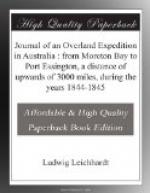May 10.—This morning they came again, and, when our bullocks were loaded and we were about to start, I went down to them and took a sort of leave. We had scarcely proceeded half a mile, when we missed the tinkling of our bell, and found that Charley had forgotten to put it on the horse’s neck, and had left it behind. Mr. Calvert and Brown, therefore, returned to look for it, and, upon reaching the place where the camp had been made, saw the natives examining and beating every part of it; at the approach of the horsemen, however, they retired to the other side of the river; but when they turned their horses’ heads, after having found the bell, the natives followed them, and threw three spears after them—whether it was out of mere wantonness, or with hostile intentions, I do not know, though I was inclined to believe the first. It was, nevertheless, a warning to us not to repose too much confidence in them. Mr. Roper met to-day with a severe accident, which nearly cost him his life. It was a very common practice to make our horses stop by catching them by the tails; as he tried to do this with his horse, which was not yet accustomed to him, the animal struck out at him, and kicked him with both feet on the chest. Roper happily recovered after some faintness, but complained for several days afterwards of external pain. We travelled this day about four miles and a half N.N.E. along the river side, following a well-beaten path of the natives.
The river was again confined in its own valley, with quartzose rocks (Psammite) on one side, and the falls of the basaltic table land on the other. Basalt was, however, observed here about on several spots at the left bank, and quartz porphyry composed the ridges near our last encampment. The river divided here into a great number of anabranches, but all confined in the same valley, and united by intermediate channels. The bed of it had again become sandy, with small pebbles of pegmatite and quartz. Casuarinas were plentiful on its banks; the poplar-gum, and the Moreton Bay ash on the adjacent flats; Tristania, with pubescent leaves round some lagoons; narrow-leaved Ironbark, and poplar-gum grew on the hills; and rich grass every where.
The night was clear, but the morning foggy, and the dew very heavy. The wind was from the northward, and, as usual, very strong after sunset.




